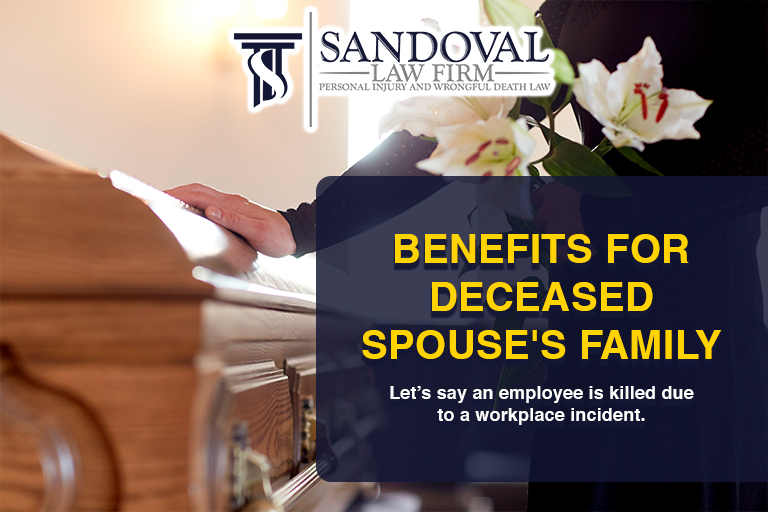In Texas, workers compensation is designed to protect employees in the event a work-related fatal incident places loved ones in financial distress.
Here is an example. Let’s say an employee is killed due to a workplace incident. That employee had a marriage partner and two young children. In Texas, workers compensation is designed to pay out death benefits to the widowed spouse, minor dependents and other designated dependents.
In this article, we take a closer look at how workers compensation pays out death benefits specifically for widowed spouses and minor dependents.
Understanding Workers Compensation Death Benefits for Widowed Spouses
Widows and widowers who have lost a spouse due to a workplace incident are entitled to specific benefits to ensure their loss does not then cause financial hardship.
Two main categories of death benefits exist: reimbursement for burial costs and regular income replacement for a set period that can last throughout life unless that spouse chooses to remarry.
When Do Death Benefits Begin for a Surviving Spouse?
Under Texas workers’ compensation laws, death benefits start the day following the employee’s work injury death.
The surviving spouse is entitled to a weekly payout that equals three-quarters of that employee’s regular weekly wages.
Texas stipulates benefit payouts maximums and minimums, and these are best discussed with your workers’ compensation attorney.
If surviving minor dependents are also entitled to death benefits, the total weekly payout will be shared by all. The surviving spouse is entitled to receive half of the total weekly payout and the surviving minor dependents will receive the other half, to be divided equally between them.
Many times, a surviving spouse may wish to remarry at a later date. At the time of remarriage, a final lump sum death benefit payout will be made and after that time future payouts will cease.
The final lump sum payout will equal 104 weeks (two years) of weekly payouts.
How Can a Surviving Spouse Begin Receiving Death Benefits?
In Texas, in order to apply to begin receiving death benefits, including reimbursement for burial costs and income replacement, it is first necessary to complete a form called “Beneficiary Claim for Death Benefits,” or DWC Form-042.
While most claimants will complete the form more quickly than this, the state of Texas mandates that it must be completed and submitted within one year of the date of passing.
Widows, widowers and individuals who paid for burial costs (whether related or not) are legally entitled to submit a claim against workers’ compensation in Texas.
It can be wise to consult your workers compensation attorney for help completing DWC Form-042 to ensure maximum legally entitled workers’ compensation benefits are received in a timely fashion.
Understanding Workers Compensation Death Benefits for Minor Dependents
One area where Texas workers’ compensation law is still poorly understood is in the case of how death benefits for minor dependents works.
Here is an example. Let’s say a minor child who had no dependents was killed due to a workplace incident. The primary requirement in the state of Texas for receipt of death benefits is that the employee was injured or killed while “on the job”. It does not matter if the employee was a child who had no dependents. The child’s family is still entitled to workers’ compensation benefits, including reimbursement for burial costs.
In this section, we will take a closer look at how Texas workers compensation handles claims for a deceased minor dependent.
How Can You Apply for Death Benefits After a Child is Killed at Work?
According to the Texas Department of Insurance, if a worker of any age is killed while on the job, surviving family members of any age have the legal right to claim death benefits.
For a child who is killed while on the job, eligible family members may include parents (whether dependent or independent), surviving siblings and grandparents.
In some cases, the deceased minor child may have been providing financial support to death benefit beneficiaries, including surviving siblings, parents and/or grandparents.
In other cases, the deceased minor child may not have been providing financial support to any other individuals.
Regardless, in the state of Texas, surviving family members whether dependent or independent are still entitled to receive death benefits.
In the same way that a surviving spouse (widow, widower) must complete a form called “Beneficiary Claim for Death Benefits,” or DWC Form-042, the surviving family members of a deceased minor child must also complete this form.
It can be important to work with your workers’ compensation lawyer to complete this form to ensure you receive the full legal benefits you are entitled to under Texas law when a child with no surviving dependents is killed while on the job.
When Do Death Benefits Begin for Surviving Family Members?
For dependent parents – that is, surviving parents who depended upon the deceased child for financial assistance – the death benefit begins the day after the fatal accident and continues for up to 364 weeks.
For independent parents – that is, surviving parents who did not depend on the deceased child for financial support – death benefits begin the day after the fatal accident and continue for up to 104 weeks.
Reimbursement for the full cost of burial expenses is also made to the individual who paid for the burial, whether a family member or not.
In Texas, making a workers compensation claim after a child without any dependents was killed on the job can be more challenging. First, the applicant must prove the child’s death was related to their job.
As with all other workers compensation claims, DWC Form-042 must be completed and submitted within one year following the fatal accident, although most applicants complete this process much more quickly.
Because Texas workers compensation claims can be challenging to navigate, it is smart to consult your workers compensation attorney before beginning the claims process. It is easier to ensure the most complete and accurate form submission the first time than must revisit the application later to make corrections or updates.
Sandoval Law Firm, PLLC helps injured workers and their families. Call (346) 347-7777 for a free and informative consultation!














